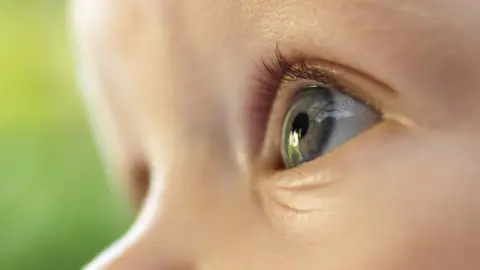Gene therapy for rare eye disease set to be offered on NHS
 Getty Images
Getty ImagesPatients with a rare inherited eye disorder are set to be able to access a new gene therapy on the NHS which slows down sight loss.
Draft NICE guidance recommends the therapy (Luxturna) to treat inherited retinal dystrophies.
The National Institute for Health and Care Excellence estimates just under 90 people in England will be eligible for the treatment.
Drug company Novartis agreed a discount for the NHS on the £613,410 price.
Without the deal, the therapy, voretigene neparvovec, would have breached the regulator's budget impact test.
'Breakthrough therapy'
Inherited retinal dystrophies cause the gradual degeneration of the light-sensitive cells on the retina. They are usually diagnosed in childhood.
The condition causes a loss of vision which ultimately leads to almost total blindness. At the moment, there is no treatment.
People with a mutation of the RPE65 gene will be suitable for the new treatment. The gene should provide the instructions to make a protein that is key to normal vision.
In the gene therapy, a healthy copy of the gene is injected directly into the eye so a working protein can be produced. Patients have to have some functioning retinal cells for it to work.
Research has shown that, in the short term, voretigene neparvovec improves vision and prevents the condition from getting worse.
NICE said there was no long-term clinical evidence but it was "biologically plausible" the treatment's effect would continue for decades.
The draft recommendations are now out for consideration by the company, healthcare professionals and patient groups. If there are no appeals, NICE expects to publish its final guidance next month. The treatment would then become available from January 2020.
Simon Stevens, chief executive of NHS England, said: "Once again the NHS is at the forefront of the genomic revolution with patients in England among the first to benefit from this revolutionary new form of treatment."
Sue Sharp, deputy chief executive at the Royal Society for Blind Children, said: "We see first-hand the devastating effect of childhood sight loss, and so we welcome news of this breakthrough therapy and its impact on the lives of children with inherited retinal dystrophies disorder."
Dr Mariya Moosajee, consultant ophthalmologist at Moorfields Eye Hospital, said: "This exciting news will give hope to patients where previously there was none.
"Diagnosing and treating genetic eye conditions is extremely complex and challenging but we are now in a position to tell patients who have a genetic change in the RPE65 gene that a treatment is available on the NHS that may help slow down their sight loss."
